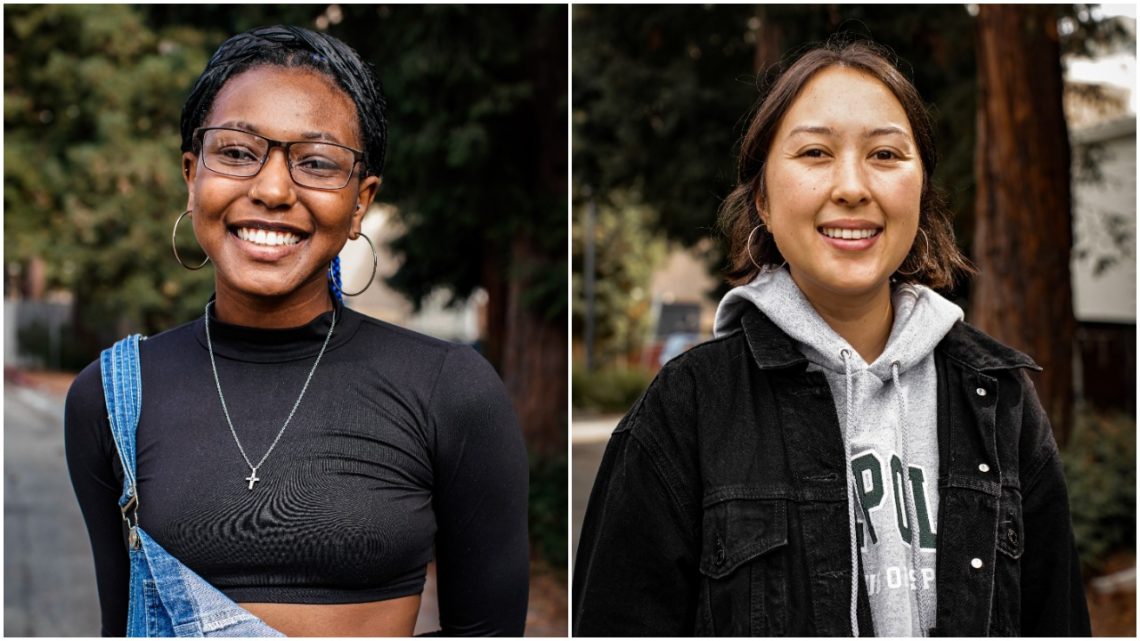
Kimyatta Newby and Olivia Lozano. (Photo: Beryl Terry ’23)
Berkeley Journalism is awarding Reporters in Residence Fellowships to two East Bay journalists, each of whom will receive a $2,000 stipend and opportunities to become part of the school’s community.
As Reporters in Residence, Olivia Lozano and Kimyatta Newby will audit the School’s introduction to reporting classes, get one-on-one mentorship from class instructors and earn a certificate of achievement during the School’s spring commencement.
The program, launched last year, is part of Dean Geeta Anand’s ambitious efforts to take the lid off who gets to be a journalist in this country. The program recruited journalists from Richmond, a Bay Area community long reported on by our student publishing site Richmond Confidential. Previously called the Richmond Fellows program, its name has now been changed to the Reporters in Residence Program to reflect the dean’s ambition to expand the program to bring in more young people from other communities in the Bay Area.
Our first Reporter in Residence was María Bernal, a first-generation American and DACA recipient who would go on to excel in the program. With the encouragement of her instructors, María applied, and was accepted into Berkeley Journalism, a path she hadn’t considered before. She is set to graduate in 2023.
Olivia Lozano, one of the two Reporters in Residence this year, is a 23-year-old health contributor to Richmond Pulse, a youth-led community media outlet, and a recent graduate of California Polytechnic State University. There, she majored in nutrition and was on track to become a dietician.
Then, Donald Trump was elected president, and Lozano figured it was, “an excellent time to be a journalist.”
The election, she said, “kind of woke me up.”
Seeking opportunities to write, she came upon Richmond Pulse, in her hometown.
As a journalist, Lozano is using her background in health and nutrition to report on inequalities in food systems and the food industry, and Richmond’s response to hunger during the pandemic.
“I really believe that food is healing and that this knowledge should be shared,” Lozano said. “The food system in America is flawed and it continually neglects people of color, immigrants, and vulnerable populations. The meat and dairy lobbies are organizations that exacerbate these problems, for example.”
The Reporters in Residence program is part of her journey to become a more resilient and effective storyteller. And it offers her a chance to write about the people and a community she knows well.
“I am excited to give back to a city that I’ve lived in for a majority of my life,” Lozano said.
Newby, 19, they/them, is a San Pablo native and is studying political science and criminology (virtually) at Howard University. They also write commentary for Richmond Pulse, work as an office assistant at Contra Costa College, and organize protests against police brutality. This year, in recognition of their work, Contra Costa County named them Student Humanitarian of the Year.
“I’ve always liked writing,” said Newby, who was asked to write for Richmond Pulse after being interviewed by a reporter there about a protest they organized in Pinole following the killing of George Floyd last spring.
Newby says it’s given them the chance to help the Black community understand what’s happening so people won’t feel excluded from the government that is supposed to be taking care of them.
News accessibility for the Black community is a major problem, Newby said, not only because of what they call “gate-keeping language,” but also because of distrust and the guarding of information behind paywalls.
To make it more accessible, Newby uses the experience of growing up in a working-class family and speaking Ebonics to connect to the community and portray it more accurately.
“If I’m writing for Black people, I’m probably gonna write in a way that Black people understand it,” Newby said, to show “justice, and not only tragedies.”
By Sitina Xu (‘23)
